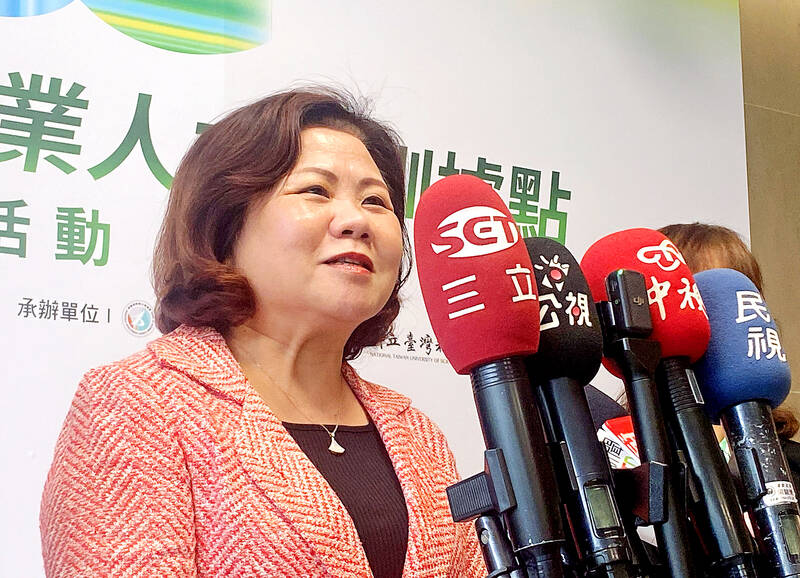Most of the participants in a Ministry of Labor meeting on Thursday discussing the recruitment of Indian migrant workers to alleviate Taiwan’s labor shortage have agreed that the manufacturing sector should be the first industry to start recruiting.
Migrant worker groups, employer representatives, labor broker associations and experts from Taiwan and India attended the meeting to discuss industries suitable for recruitment, the number of migrant workers to be recruited and the recruitment methods for a small-scale trial.
In February, Taiwan and India signed a memorandum of understanding to bring in Indian migrant workers as Taiwan is facing a shortage of labor in areas such as manufacturing, construction and agriculture.

Photo: CNA
Su Yu-kuo (蘇裕國), head of the Workforce Development Agency’s Cross-Border Workforce Affairs Center, said that a consensus was reached for the manufacturing industry to be the first to recruit Indian workers.
Suggestions were also made to let Taiwanese businesses with factories or operation sites in India be the first in the manufacturing industry to recruit Indian workers, Su said.
Regarding the number of migrant workers to be recruited, most participants thought it would be better to decide this at a later stage, as it was more important to first identify the industries that would be recruiting, he said.
Migrant worker groups suggested using direct recruitment, without going through brokers, to reduce controversies and disputes, he added.
Brokers in Taiwan and migrants’ countries have been known to charge high fees, which put workers in debt for at least their first year of employment, he said.
At the same time, experts and employer groups advocated for a dual approach involving direct hiring and brokerage systems.
They proposed the careful selection of brokerage firms to avoid problems such as migrant workers being charged hefty job placement fees and monthly service fees.
Indian experts at the meeting suggested that there should be further discussions with the Indian government to work out details for direct recruitment, should it become the main way of bringing in Indian migrant workers, Su said.
Further meetings would be held to address additional issues related to the recruitment of Indian migrant workers, he said.
Following the discussions, opinions and suggestions would be conveyed to the Indian government, he said.

Taiwan’s rapidly aging population is fueling a sharp increase in homes occupied solely by elderly people, a trend that is reshaping the nation’s housing market and social fabric, real-estate brokers said yesterday. About 850,000 residences were occupied by elderly people in the first quarter, including 655,000 that housed only one resident, the Ministry of the Interior said. The figures have nearly doubled from a decade earlier, Great Home Realty Co (大家房屋) said, as people aged 65 and older now make up 20.8 percent of the population. “The so-called silver tsunami represents more than just a demographic shift — it could fundamentally redefine the

The US government on Wednesday sanctioned more than two dozen companies in China, Turkey and the United Arab Emirates, including offshoots of a US chip firm, accusing the businesses of providing illicit support to Iran’s military or proxies. The US Department of Commerce included two subsidiaries of US-based chip distributor Arrow Electronics Inc (艾睿電子) on its so-called entity list published on the federal register for facilitating purchases by Iran’s proxies of US tech. Arrow spokesman John Hourigan said that the subsidiaries have been operating in full compliance with US export control regulations and his company is discussing with the US Bureau of

Businesses across the global semiconductor supply chain are bracing themselves for disruptions from an escalating trade war, after China imposed curbs on rare earth mineral exports and the US responded with additional tariffs and restrictions on software sales to the Asian nation. China’s restrictions, the most targeted move yet to limit supplies of rare earth materials, represent the first major attempt by Beijing to exercise long-arm jurisdiction over foreign companies to target the semiconductor industry, threatening to stall the chips powering the artificial intelligence (AI) boom. They prompted US President Donald Trump on Friday to announce that he would impose an additional

Pegatron Corp (和碩), a key assembler of Apple Inc’s iPhones, on Thursday reported a 12.3 percent year-on-year decline in revenue for last quarter to NT$257.86 billion (US$8.44 billion), but it expects revenue to improve in the second half on traditional holiday demand. The fourth quarter is usually the peak season for its communications products, a company official said on condition of anonymity. As Apple released its new iPhone 17 series early last month, sales in the communications segment rose sequentially last month, the official said. Shipments to Apple have been stable and in line with earlier expectations, they said. Pegatron shipped 2.4 million notebook